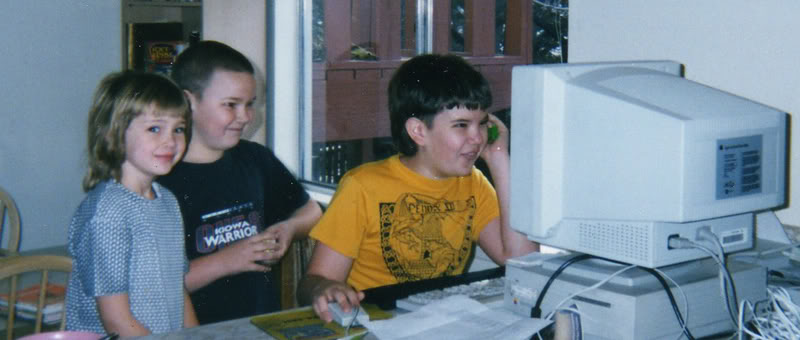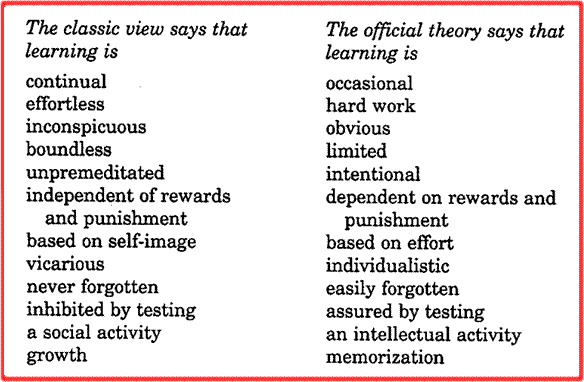
Zoombini Excitement
Sandra Dodd
April, 1999
My children don’t go to school. The boys are 12 and 10, and lately they have been obsessed with a game they borrowed, Warcraft II, which they play on a Macintosh right next to mine. This has been great for me, because just as with the “parallel play” of toddlers, we’re together, but have nothing to fight about. Well hardly anything. They want me off the phone sometimes so they can call their friends and brag about how many pixellated orcs they killed. And I would like to listen to Prince, or Donovan, and they whine “I can’t hear the game, mom…”
So if I’m sitting right there at a computer why am I not writing the most important thing in my life, a column for Enchanted Families? Because there are people interested in learning, and they’re asking me questions.
One of the finest ways to clarify a concept is to explain it to someone else. It’s one thing to passively understand (at least momentarily in short-term memory) how to tie a clove hitch or to make waffles, but to really know the thing you need to have done it so much you can do it while you’re sleepy, in the dark, in a wind storm. Or so much that you could pass the secret skill on to another person. Be prepared for the most important question of all: “Why?”
Sometimes the people asking “why” are my children. Sometimes they’re friends who come over, or call. Often they’re people (friends, acquaintances, strangers) who e-mail me for information. At the moment I have outstanding questions in my e-mail inbox about sources for polyphonic Christmas music for beginners; a detail from pre-1978 about awards given in an organization I joined in those days; an inquiry as to whether a friend fell off the planet (no, he just got laid off and so hasn’t been checking e-mail); whether hermits can practice virtue or whether it takes other humans to practice on; what were Anglo-Saxon women’s names like? By “outstanding” I don’t just mean great questions, but questions I haven’t yet had time or inspiration to answer fully. While I’m willing to say “I don’t know” when it’s true, these are things about which I do have some knowledge. All I have to do is write in some detail what the people want to know.

Crazy-thinking isn’t bad.
I’m writing this two days before leaving to speak at a conference in southern California. My session is called “Permission to Think Without Permission.” It might seem silly, but most people seem to feel unauthorized to think wildly. Mixing and matching thoughts will stir up things you had forgotten you had remembered. Like emptying out a closet full of cool stuff and sorting through it to show your kids things you had forgotten you had, just messing with ideas and answering unusual questions will be a learning experience for all concerned, and will produce more and different brain trails.
And that sleep I wanted? In the three days I worked on and off on this little missive, I slept a lot, and had the most wonderful dreams. If I had told you about them we could talk for hours, and we’d all be thinking new and interesting thoughts.
I’d like to recommend a book you might have to special order, but you won’t regret it if you do: The Book of Learning and Forgetting by Frank Smith, Teachers College Press, Columbia University, 1998. ISBN: 0-8077-3750-X. It’s about how people learn—how easy and effortless natural learning is, and how difficult-to-impossible “formal education” is compared to the real learning that goes on every day of a person’s life. If your family’s priority is learning, you can spend time in no better way than playing with and rearranging the ideas you already have and incorporating bits of what you see, hear, smell, taste, feel and think.
It first appeared in Enchanted Families, May/June 1999
(and yes, it did end kind of abruptly)
When this webpage was made, my kids were 16, 19, 21, happy and whole.
When I came and reformatted a bit in 2015, my kids were 23 (visiting England on the way back from a stay in India), 25 (recently married) and 28 (planning to return to New Mexico after working in Austin for Blizzard Entertainment for eight years, with his live-in partner and her daughter). Still happy and whole.
| In 2023, I have come in to narrow the page so it can be read from phones. My children are all in their 30s. Kirby is married and has three daughters. Marty is married, with a son and daughter. Holly is still single, but has her own house. All of them live in Albuquerque, for now. Our house got bigger, as they moved out, and it's just me and Keith. |
Some other information on and from The Book of Learning and Forgetting:
Reflections on Education
General Overview
Two Visions

Classic View
The Official Theory of Learning and Forgetting
Repairing the Damage (this section isn't very useful to unschoolers or anyone else, really)

